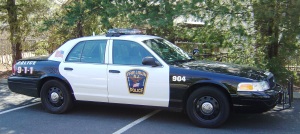 What follows is a series of personal accounts because often without realizing it, those of us in the United States born White, like myself, have experienced a lifetime of privileges compared to people of color. This influences our views with responses like, “Why don’t they just show some respect and everything will be ok!” But what is really going on inside a person when they respond powerfully and maybe even inappropriately in situations steeped in racial profiling? Situations like the ones that prompted strong responses from Michael Brown’s killing by a White police officer in Ferguson, Missouri; Eric Garner’s choke-hold death by police in New York City or the police harassment of Professor Henry Louise Gates Jr. in front of his own home during the events that inspired the infamous “Beer Summit” at the White House in 2009. It seems there will always be fresh wounds to open up old ones for those who have these daily experiences of racism. Reminders that racism in America is far from over. One of my favorite T-shirts that I saw somewhere offers a clue into this world: “I’m tired I’ve been Black all day!”
What follows is a series of personal accounts because often without realizing it, those of us in the United States born White, like myself, have experienced a lifetime of privileges compared to people of color. This influences our views with responses like, “Why don’t they just show some respect and everything will be ok!” But what is really going on inside a person when they respond powerfully and maybe even inappropriately in situations steeped in racial profiling? Situations like the ones that prompted strong responses from Michael Brown’s killing by a White police officer in Ferguson, Missouri; Eric Garner’s choke-hold death by police in New York City or the police harassment of Professor Henry Louise Gates Jr. in front of his own home during the events that inspired the infamous “Beer Summit” at the White House in 2009. It seems there will always be fresh wounds to open up old ones for those who have these daily experiences of racism. Reminders that racism in America is far from over. One of my favorite T-shirts that I saw somewhere offers a clue into this world: “I’m tired I’ve been Black all day!” 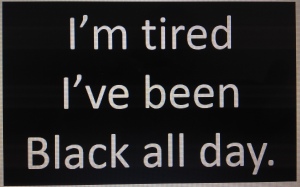
Of course, all of these perspectives and how we respond to life events are directly correlated to our individual experiences that accumulate over each of our lifetimes. For the most part, we cannot possibly fathom or always have compassion for why some people do what they do; unless we have parallel experiences that offer a glimpse. As a White female, who lived a very underprivileged life as a child and adolescent, I am aware that I have still experienced White privileges; which first occurred when I was a child. Paradoxically, these early events were set in an environment where my Whiteness also offered a brief glimpse of what it must be like to be Black in America all day long.
From 1967-1969, when I was 9-12 years old I lived in East Palo Alto, California. E.P.A. was dubbed Little Nairobi at the time but it actually resembled a mini-Oakland; with only an overpass dividing its poverty-stricken Black neighborhoods from affluent White Palo Alto. Then and now, Palo Alto is one of the wealthiest communities in the country with spacious manicured yards and opulent mansions lining University Avenue. While living in E.P.A. I also received three years of Black history in elementary school.
Interestingly, those three years of Black history ended up being the foundation of my U.S. history during what was a very transient childhood before and after living in E.P.A. Long before most of the U.S. learned about the injustices of slavery from the popular mini-series Roots, I was reading Richard Wright’s Black Boy and Native Son and studying Harriet Tubman and the Underground Railroad. For three years I also witnessed firsthand the San Francisco Bay Area’s contrast of Black and White realities every time my mother drove us across that overpass; where I ogled the mansions lining University Avenue. 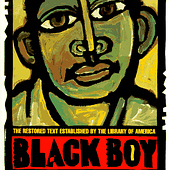
Our family of five children had three who attended elementary school at the time. We were the only White children and I was the oldest. A Korean girl quickly became my best friend and there was also one Latino girl. While I learned about the history of oppression and slavery in America, I shared the experience of poverty with my school peers, and may have even been one of the recipients of the Black Panthers free breakfast program in the SF Bay Area. Though poverty was a shared experience with my peers, my White skin never allowed me to fit in. This was evident from the bullying I endured and by the beating up I received on my daily walk home from school.
Although the feeling of being a perpetual outsider has lingered throughout my life, I truly believe that the reason I did not become bitter from these terrifying, racially motivated events was because they coincided with the descriptions of the cruel Black history I was learning and reading about in the classroom every day. I understood the reasons behind the vitriol of my peers towards me; I was a walking, White target. Then an event occurred that really cemented the reality of the Black-White disparities in America.
To be clear, I missed huge time periods of school before and after landing in E.P.A. So when I was in 6th grade and we had the standard school testing I was flabbergasted when I was listed as 1 of 3 in our 6th grade class as having made the National Junior Honor Society for our high IQ scores. It was the first commendation I ever remember earning during my elementary education and it really impacted my sense of self-worth. Aside of the self-pride I felt during this moment, something else became blatantly obvious. The other two recipients were my friends, the Korean and the Latina girls. None of the Black students in our class had made the cut! I could not understand this because there were several students in our class that were clearly much smarter than I was. Why didn’t they get to become members of this elite group that came with a special card embossed with a gold flame? Something was amiss and it was all about color but I did not quite understand how until years later when testing bias research revealed the systemic and cultural disparities as the probable reason those brilliant Black peers of mine were passed over. I’ve always wondered what happened to them. The name Skipper Hicks stands out as the smartest one in our 6th grade class that year. 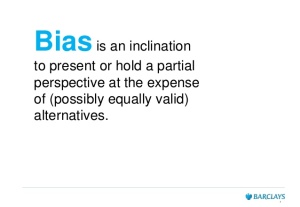
Fast forward 20+ years later. I was an alternative high school teacher in what was labeled the Whitest County in California at the time. Here I saw the continuing trends of racial bias in the U.S. in our small alternative high school, Sierra Mountain High School; which had a higher percentage of students of color than the larger, comprehensive high school in Nevada County. As a teacher I became privy to student accounts of bullying and racial slurs that explained why students had not felt welcome at Nevada Union High School at the time; practically forcing them to attend the alternative high school for reasons of self-preservation.
Moreover, as a high school teacher, I heard numerous frustrating stories about young men in their late teens and early 20’s being stopped by police while driving. I also drove over the speed limit (occasionally) and was stopped for other things like taillights, etc. Yet, I will admit that I was a fairly good looking blonde, White female and never received a ticket during these years. I was fully aware I was experiencing privilege for my looks, age and gender more than anything else. I sympathized with these young men because I understood this level of age and gender profiling was going on; though racial profiling did not seem to be an issue at the time. Young males were familiar members of the community just as I was, but they never seemed to escape that fine or ticket.
Fast forward, 15+ years later. I was living in the Sacramento, Roseville area of California during the middle of the Recession. There I was, minding my own business, driving between Roseville and Sacramento. My driving habits had not changed. Yet, three times in two weeks, I was stopped by a police officer; two times in Roseville and once in Sacramento. I will never forget how the frustration, fear of another ticket I could not afford, and anger welled up in me at that third stop. I was livid! I was unemployed, had just lost everything in the Recession, was living with my children and working to rebuild my life at 50. I did not need another ticket.
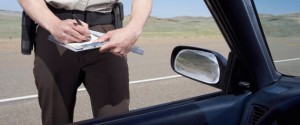 When the officer walked up to me, it was as if I was watching myself on an episode of Cops. For the first time in my life, instead of using humor to diffuse my anxiety and to create a positive interaction with the officer to help me get out of the ticket, I had attitude! It was obvious that my age was now working against me and no matter how I played it, I could not bring back those looks of 20 years ago. I could not change my age any more than a person can change their skin color. There was no going back for me or them. The only lucky one in this situation seems to be the young, White male who will age, eventually reducing his propensity for being stopped; provided of course, that the pressure for police quotas does not make every little driving infraction by every driver a revenue source for struggling cities. And of course, the only possible lucky ones in each of these scenarios are the temporary privileges of good-looking young women who take the ridiculous pressure off of police to reach quotas; if even for just a few minutes. So, as I was ousted from that exclusive club, the officer obviously working on a quota, doled out a very hefty $450 ticket to me that day rather than the standard warning of 20 years ago. Wow! So this is what it’s like to get profiled! It is common knowledge in the Black community that Blacks get stopped more than Whites, hence the infamous Driving While Black slogan.
When the officer walked up to me, it was as if I was watching myself on an episode of Cops. For the first time in my life, instead of using humor to diffuse my anxiety and to create a positive interaction with the officer to help me get out of the ticket, I had attitude! It was obvious that my age was now working against me and no matter how I played it, I could not bring back those looks of 20 years ago. I could not change my age any more than a person can change their skin color. There was no going back for me or them. The only lucky one in this situation seems to be the young, White male who will age, eventually reducing his propensity for being stopped; provided of course, that the pressure for police quotas does not make every little driving infraction by every driver a revenue source for struggling cities. And of course, the only possible lucky ones in each of these scenarios are the temporary privileges of good-looking young women who take the ridiculous pressure off of police to reach quotas; if even for just a few minutes. So, as I was ousted from that exclusive club, the officer obviously working on a quota, doled out a very hefty $450 ticket to me that day rather than the standard warning of 20 years ago. Wow! So this is what it’s like to get profiled! It is common knowledge in the Black community that Blacks get stopped more than Whites, hence the infamous Driving While Black slogan. 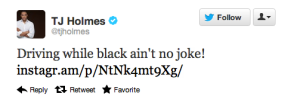
But something else occurred to me on that day. I realized that this is exactly why it is so hard for people who are profiled, whether it be for age, ethnicity or gender, not to be disrespectful; especially when the unfair singling out is repeated and repeated and repeated. That third ticket, when my White privilege took a U-turn, was just an affirmation of how wrong our criminal justice system is and how much bias still plays into the outcomes and how hard it is to maintain one’s composure after experiencing so much injustice. And it is the poor and struggling who are hurt most, when their daily economic struggles are exacerbated with costly, time-consuming tickets. Furthermore, these experiences have illuminated me about how police quotas factor into bias and racial profiling.
I suppose my White privilege has returned since then. Although I drive much more carefully, I know that my skin color is still saving me on the road. I have recently reflected on yet another experience of White privilege that I had without realizing it. It involved an ex-husband who used to have a drug habit; a habit that put him and me at incredible risk. I now know deep in my soul that he would have been in prison a long time ago if he had been Black and that I may just have had charges pressed against me back then if I had been Black because I discovered that there were many times when we were driving that he had contraband on his person and in my vehicle, unbeknownst to me. This seems to align with national statistics because Whites have higher rates of drug use than Blacks, yet we were just the lucky ones because we were never stopped!
Finally, in a sort of warped, time travel coincidence, my childhood awareness of Black/White disparities was reopened when I was working for six months on the White side of Palo Alto in 2008. I was astounded when I read a current story online in the SF Gate. 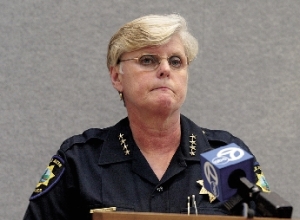 The police chief, Lynne Johnson, who eventually retired, instructed her officers to stop all Black males wearing “Doo rags” due to recent neighborhood robberies by a Black male wearing a doo rag. Yes! We have come so far, but we still have so far to go. I am sure they don’t stop all White males with beards when there is a crime by a White male with a beard in Palo Alto!
The police chief, Lynne Johnson, who eventually retired, instructed her officers to stop all Black males wearing “Doo rags” due to recent neighborhood robberies by a Black male wearing a doo rag. Yes! We have come so far, but we still have so far to go. I am sure they don’t stop all White males with beards when there is a crime by a White male with a beard in Palo Alto!
* Congratulations for making it to the end of this very long post! Just want to explain that I use Wikipedia frequently as a resource link to prevent ads from dominating resource information and to by-pass lengthy research published that would be ultra-boring to the layperson. I am happy to send any formal research on above subjects if you are interested.

